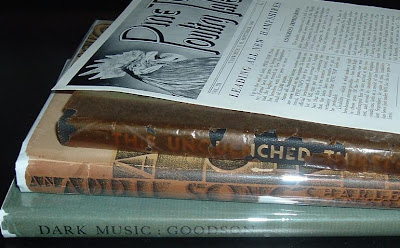
What do poultry and poetry have in common? Seemingly nothing; I've never come across a chicken farmer who wrote and collected poetry. Until I learned of Wilbur Chapman Goodson, the author of a collection of poems titled, Dark Music (Falmouth Publishing House, Portland, Maine, 1940).

From the Preface, written by fellow New Englander, poet, and Goodson's former professor at Wesleyan, Wilbert Snow, I learned about an interesting bibliophile who collected autographed editions of books from all the leading American and English poets writing at that time (1930s). Not only that, but he also obtained from them holograph copies of his favorite lyrics and framed them. All while raising prize-winning roosters and pullets.
Snow infers scholastic ability at Wesleyan and a desire on Goodson's part to follow his muse. But the country was steeped in the Great Depression and apparently Goodson was motivated to try his hand at a vocation that could actually support him. A career choice between poetry and poultry at least invoked the poetic devices of alliteration and rhyme. And so Goodson started a poultry farm in Tamworth, New Hampshire and became successful at it. But he never abandoned, it appears, his love for poetry. He became quite an accomplished collector and wrote and published his own verse.
I've only been able to find a copy of the Dark Music title, one of only 300 printed. If Goodson published subsequent volumes, I haven't found them yet. But I have found part of his collection. I recently purchased, from a bookseller in Massachusetts, two volumes of poetry that had belonged to Goodson: An April Song: New Poems, by Charles Hanson Towne (Farrar and Rinehart, NY 1937) and This Unquenched Thirst, by Minnie Markham Kerr (Dorrance & Company, Philadelphia, 1938). Each is autographed from the poet to W.C. Goodson and both copies have Goodson's bookplate (full name) affixed to the front pastedown endpaper.
While I feel fortunate to have made this connection and to have obtained pieces of what I presume to have been a remarkable collection, I am puzzled that any part of such a collection would have been lost, sold, or otherwise culled from the whole. The entire collection deserved to have been kept intact to give a full measure of the bibliophile's intent for such a collection in the first place.
But that's too idealistic, I'm afraid. There are many reasons why pieces of a collection might find their way elsewhere through the years. They could have been gifts to others by the collector. The collection's theme may have evolved into something quite different from its beginnings and these titles no longer fit in.
Those poets whom Goodson collected and that have now found their way into my collection are not household names. Nor do they have much literary significance or value in the history or second-hand markets for literature. But they now comprise 100 percent of another of my quirky little collections. And I'd love to see a list of poets that comprised Goodson's collection over the years. Some of the titans of American and English poetry were writing during Goodson's collecting years. If he was able to secure signed copies of their books and handwritten passages, his collection would have become one of the more enviable libraries on either side of the pond.





And to round out this little collection, I was able to locate and purchase a few copies of Pine Top Poultry Tales, a newsletter Goodson wrote about his poultry farming operation. Looks like a pretty nice marketing and promotional piece. His writing skills are put to good use here for his business.


I end this with a poem from Wilbur Chapman Goodson. It's the last poem in Dark Music and appears to be the poem from which the title of the book emerged. I hope it was not the last poem he wrote or published.
NIGHTPIECE
Here in the quiet woods the night creeps in--
Between the slowly falling flakes of snow--
And burrows down to soft and silent sleep.
Here in the quiet woods, the topmost boughs
Of tamarack reach up against the clouds
Too thick to let the light of stars shine through.
Here in a deep and never-ending peace
There is a silence thick and velvet black
That settles over hills and leafless trees
And brings dark music to my tired ears.
Here in the early hours of dawn the stars
Break though the clouds, and wrinkled moonlight smiles
Across the frozen pond and snow-filled fields.
It must have been like this once long ago.
Realized after inserting the last photo in this post that the Italian professor on the left bears somewhat of a resemblance to Col. Sanders of Kentucky Fried Chicken fame!
ReplyDeleteJ Wilbur Chapman Goodson was my Grandfather.
ReplyDeleteThanks for getting in touch. My dad grew up in Tamworth and remembered going to your grandfather's farm for fresh eggs. He had no idea about his writing. I have found a few more books online with your grandfather's bookplate since this blog post some 12 years ago. So at least a few in his book collection got away. Hope the bulk of the collection remained intact with family or a library's archives somewhere. Seemed like a pretty impressive collection.
Delete